If you’re having trouble hearing in a noisy situation, you might want to turn your head. New research finds that people of all ages depend more on their right ear than their left, and remember information better if it comes through their right ear. The findings were presented at the annual meeting of the Acoustical Society of America in New Orleans on December 6.
Kids’ ears work differently than adults' do. Previous studies have found that children's auditory systems can’t separate and process information coming through both of their ears at the same time, and rely more on the auditory pathway coming from the right. This reliance on the right ear tends to decrease when kids reach their teens, but the findings suggest that in certain situations, right-ear dominance persists long into adulthood.
To study how we process information through both our ears, Auburn University audiologists brought 41 adult subjects (between the ages of 19 and 28) into the lab to complete dichotic listening tests, which involve listening to different auditory inputs in each ear. They were either supposed to pay attention only to the words, sentences, or numbers they heard in one ear while ignoring the other, or they were asked to repeat all the words they heard in both ears. In this case, the researchers slowly upped the number of items the test subjects were asked to remember during each hearing test.

They found that the harder the memory tests got, the more performance varied between the ears. While both ears performed equally when people were asked to remember only four or so words, when the number got higher, the difference between their abilities became more apparent. When asked to only focus on information coming through their right ear, people’s performance on the memory task increased by an average of 8 percent. For some people, the result was even more dramatic—one person performed 40 percent better while listening with only their right ear.
"Conventional research shows that right-ear advantage diminishes around age 13, but our results indicate this is related to the demand of the task,” one of the researchers, assistant professor Aurora Weaver, explained in a press release. In other words, when the going gets tough, the right ear steps up.
